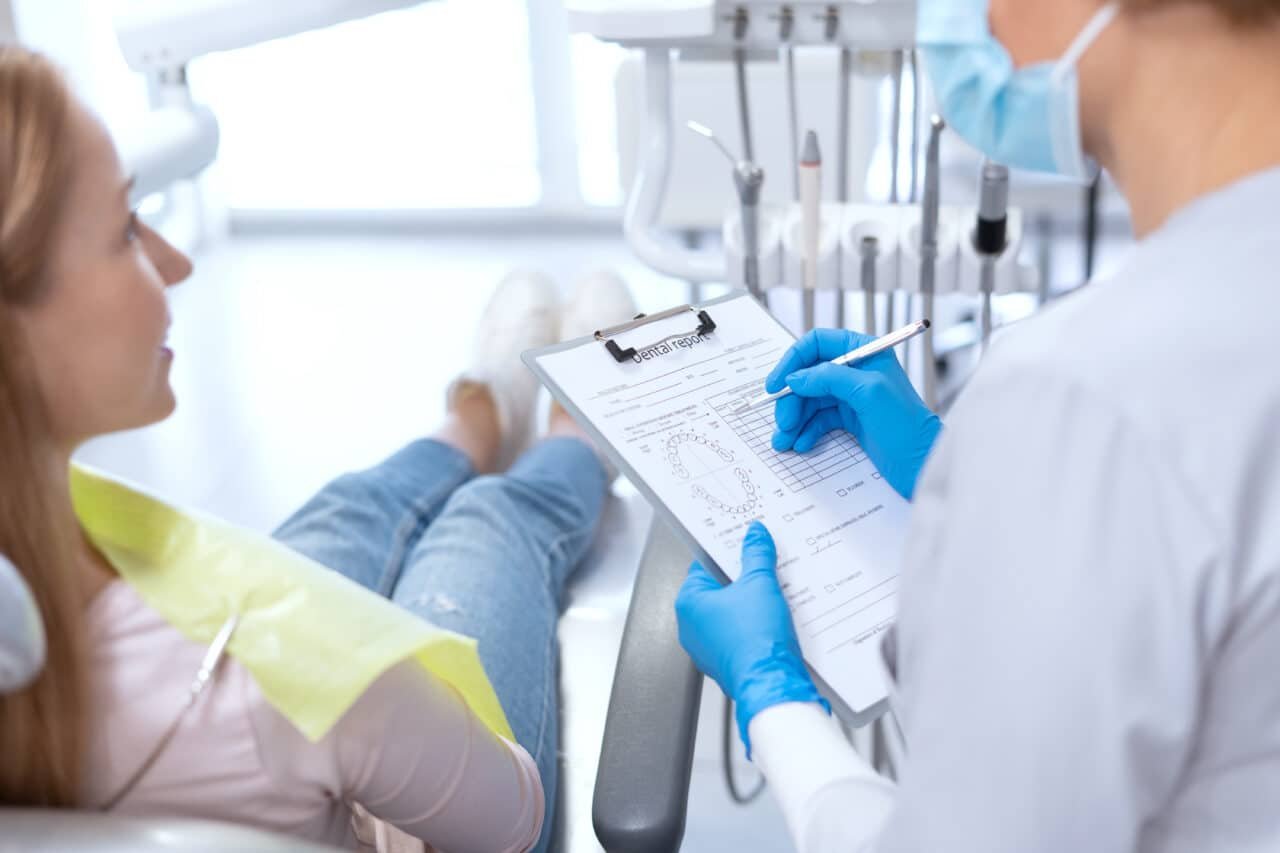You’ve come to the right place for a gorgeous smile and healthy teeth. Our office wants to make that happen for you.
Coming to the dentist for regular appointments is an important step toward improving oral health. Exams and cleanings may be uncomfortable but they are one of the best ways to get a healthy mouth. Even so, some people find visiting a dentist scary. The best way to avoid anxiety is to prepare. These tips can make your time in the dentist’s chair go smoothly.

Advanced planning is key
It’s easier to get through a dental appointment if you’re prepared in advance. There are three things you can do to prepare for your dental visit and reduce your anxiety.
- Know what you’re going to do while you wait. Waiting is a part of life and certainly part of a dental appointment. You will likely be waiting in the lobby for a few minutes and there could be some waiting in the dental chair as well as the dentist looks at your chart and the hygienist prepares to assist. Do you want to bring your favorite book or magazine, or maybe a tablet or phone with music?
- You can also bring some snacks and drinks along with you, such as a bottle of water and an energy bar. Most people don’t do this because they want their teeth to be as perfect as possible for the dentist but those who have diabetes or get hungry when they are nervous should do this. The dentist won’t mind. Just keep your drink to water rather than a sugary mix.
- Make sure that all the right equipment is available at home before you go and use them: toothbrush, floss, mouthwash, etc.
- Make sure that all the right clothes are worn–this includes socks! Your clothes should be loose and comfortable. Socks will keep your feet warmer than wearing sandals or flip-flops. Exam rooms are typically cooler than your home.
Getting your teeth cleaned regularly is important
You may think that you don’t need to go in for a dental check-up and cleaning as often as your dentist recommends, but it’s important to keep up with your appointments. The American Dental Association (ADA) recommends two cleanings per year for most people. Those who have serious gum disease or a history of cavities or tooth decay should get three cleanings per year.
Cleanings involve removing plaque from the teeth and gums, which helps prevent tooth decay and gum disease. During a cleaning, the hygienist will use special tools like an ultrasonic scaler or air polisher to remove tartar from above the gum line. This is the place where bacteria builds up between visits.
Plaque and tartar can creep beneath the gum line where it can cause problems later on down the line if left untreated. A thorough checkup also allows your dentist or hygienist to examine any potential problems with your bite alignment or jaw joint function. They may also take x-rays during this appointment so they can see inside cracks where food particles could get stuck over time.
Most people love the way their mouth and teeth feel after a good cleaning. They feel healthier and smoother. Your breath is fresher too!
Don’t skip flossing
Flossing is an essential part of maintaining good oral health, and it can help prevent tooth decay, gum disease, and bad breath. But many people don’t floss because they find it uncomfortable or time-consuming.
If you have trouble getting into the habit of flossing regularly or if you’ve never been able to establish the habit at all, there are some simple changes you can make that may make the task easier for you.
- Consider using a water pick. This is a device that shoots water into your mouth instead of traditional dental floss. It’s less messy than ordinary string or plastic picks because there’s no waste material left behind after use. All that matters is that it gets rid of food particles between teeth! Water picks are an investment and will cost more upfront than buying floss but it’s worth the investment if it gets you into the habit of taking better care of your teeth.
Try different types of floss until one works well enough for your needs. Some people prefer waxed versus unwaxed varieties. Others might choose flavored options over unflavored ones because they find them more pleasant tasting. Talk to your dentist about oral health care products.
You can also ask your dentist about oral health care products. They can recommend the right ones for you, help you choose the ones that are right for your needs and budget, and even find ones that are easy to use.
Preparing for the dentist
If you’re getting a check-up or cleaning, preparing for both what the receptionist will ask for and what you want to ask your dentist will help you feel in control of the visit. Here are some tips:
- Bring along your insurance card, dental records if you have them or the name and phone number of your last dentist. Also, bring a medication list and notes of any medical conditions/allergies that might affect treatment planning or outcomes.
- Prepare a list of questions that you want to ask your dentist. This will help keep them focused on what’s important to them and help avoid unnecessary tests or procedures being recommended.
Going to the dentist can be an uncomfortable experience for many people, but it doesn’t have to be. Getting your teeth cleaned every six months is important for keeping them healthy and preventing cavities and gum disease.
If you get nervous about dental check-ups and cleanings, take steps beforehand to prepare yourself mentally. This can include setting aside time on a weekend morning when there will be no interruptions from work or other obligations. Then call the office ahead of time so you know exactly what type of appointment you’ll need and plan to arrive 10 minutes early.
Feel free to ask the office manager what equipment may be used and about how long of a wait you will have. Finally, don’t forget to brush twice daily with fluoride toothpaste and floss once daily to keep your smile as healthy as possible!

